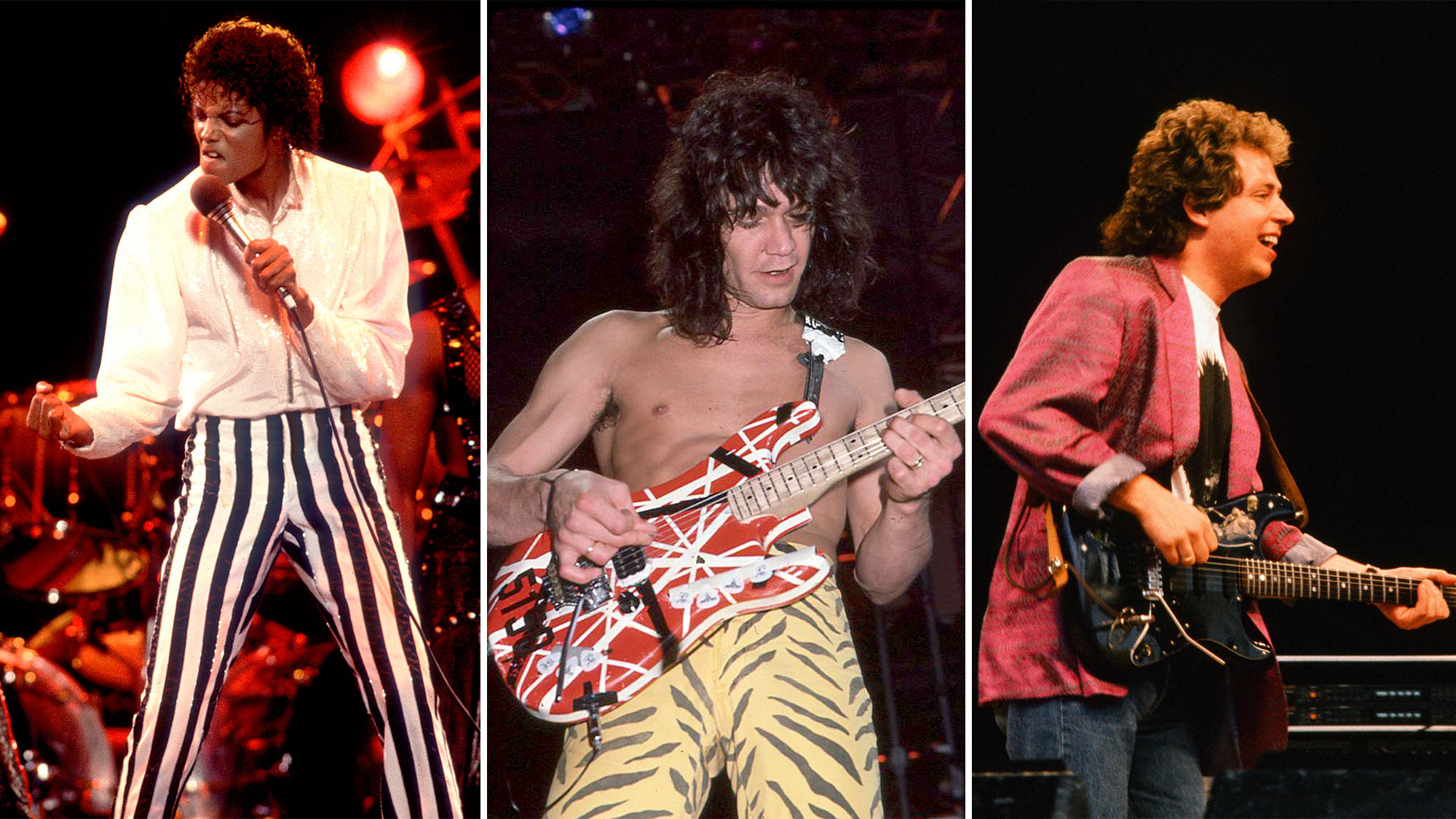Michael Jackson's Beat It: two of rock's best guitarists recall how they helped create the groundbreaking hit, and the 30-second solo that changed the world
Coming off the disco-flavored Off the Wall, Jackson wanted Thriller to appeal to as broad an audience as possible, including fans of heavier music. Enter Steve Lukather and Eddie Van Halen...

With 40 years of cultural ubiquity under its belt, it's all too easy to take Beat It, Michael Jackson's groundbreaking 1982 smash hit single, for granted.
At the time, though, it marked a watershed moment in pop music – a dancefloor-friendly R&B/rock crossover with a swaggering riff, unstoppable groove, bullseye chorus, and haywire electric guitar solo, all packaged immaculately together by one of the great pop producers of all time, Quincy Jones.
Jackson's previous solo album, 1979's Off the Wall, was propelled by a pair of brilliant chart-toppers – Don't Stop 'Til You Get Enough and Rock with You. Driven by Jackson's commanding vocals, and Jones' ever-classy string and horn arrangements, they fit the time – when disco was at the absolute peak of its popularity and influence – perfectly.
By the dawn of the '80s, though, Jackson had become fearful of being swept up by the visceral anti-disco backlash that had developed since Off the Wall, and wanted its follow-up, Thriller, to exceed the former album in every way, and appeal to audiences its slick predecessor couldn't.
That meant writing, in Jackson's words, “the type of song that I would buy if I were to buy a rock song”.
Enter: Steve Lukather.
Lukather was a first call session man and a member of Toto, who – in 1982 – were running hot off of a chart-topping hit of their own.
Get The Pick Newsletter
All the latest guitar news, interviews, lessons, reviews, deals and more, direct to your inbox!
With his Toto bandmate, fellow session A-lister Jeff Porcaro, on drums, Lukather took Jackson's initial idea and brought it to life.
"Beat It was Michael’s riff, and when I changed it a little he started dancing, doing the Michael Jackson thing two feet away from me," Lukather explained to Guitar World in 2021.
“I’m 24 years old thinking I’d made the big time! I played the bass and all the guitars on that one, except Ed's solo. I’d used all these Marshalls, then Quincy called me back saying, ‘It sounds too big! I want to make this a crossover hit – use one of your little amps!’ So I plugged in my Fender Deluxe, backed off the distortion and gave him what you hear on the final record.“
Lukather brought the rocking (but measured) edge the song called for, but Jones knew that – to reach its full potential – the song needed an exclamation point, and he knew exactly who to call...
Not expecting to hear from Quincy Jones of all people, Eddie Van Halen greeted the producer's call with a healthy dose of skepticism.
"I went off on him. I went, 'What do you want, you f-ing so-and-so!,'" Van Halen related to CNN in a 2012 interview. "And he goes, 'Is this Eddie?' I said, 'Yeah, what the hell do you want?' 'This is Quincy.' I’m thinking to myself, 'I don’t know anyone named Quincy.' He goes, 'Quincy Jones, man.' I went, 'Ohhh, sorry!' [Laughs]
"I asked, 'What can I do for you?' And he said, 'How would you like to come down and play on Michael Jackson’s new record?' And I’m thinking to myself, 'OK, ‘ABC, 1, 2, 3’ and me. How’s that going to work?"
Given a blank check by Jones to contribute to the song as he saw fit, the late guitar hero didn't hesitate to shift its gears.
"I listened to the song, and I immediately go, 'Can I change some parts?'," Van Halen recalled. "I turned to the engineer [Donn Landee, Eddie Van Halen's own, longtime engineer] and I go, 'OK, from the breakdown, chop in this part, go to this piece, pre-chorus, to the chorus, out.' Took him maybe 10 minutes to put it together. And I proceeded to improvise two solos over it.
"I was just finishing the second solo when Michael walked in. And you know artists are kind of crazy people. We’re all a little bit strange. I didn’t know how he would react to what I was doing. So I warned him before he listened. I said, 'Look, I changed the middle section of your song.'
"Now, in my mind," he went on, "he’s either going to have his bodyguards kick me out for butchering his song, or he’s going to like it. And so he gave it a listen, and he turned to me and went, 'Wow, thank you so much for having the passion to not just come in and blaze a solo, but to actually care about the song, and make it better.'"
It took Eddie less than an hour, but – in both its artistry and truly seismic impact – it's indisputably one of the greatest guitar solos of all time.
Additionally, in an amusing twist that only added to the Eddie Van Halen mystique, the solo even gave rise to an oft-repeated urban legend that the studio's monitor speakers caught fire while Eddie was laying it down.
Jennifer Batten, who served as Jackson's live guitarist from 1987 through 1997,
was all too aware of the solo's two-hand tapped power, and indeed, always chose to play it onstage just as Eddie did in the studio, telling Guitar World in 2020, "Somebody asked me the other day if I was told to play it that way or if it was my choice. It was definitely my choice because I thought it was one of the most perfect solos in history.
"I knew I couldn’t do better than Eddie. I was proud to play it as it was. And it was challenging. It’s still challenging."
Eddie Van Halen contributed the solo for free and, initially, didn't go out of his way to highlight his contribution to the smash hit. As the song rocketed up the charts, though, the author of the solo didn't remain a secret for too long.
"I’ll never forget when Tower Records was still open over here in Sherman Oaks," Van Halen recounted to CNN. "I was buying something, and Beat It was playing over the store sound system. The solo comes on, and I hear these kids in front of me going, 'Listen to this guy trying to sound like Eddie Van Halen.' I tapped him on the shoulder and said, 'That is me!' That was hilarious."
Jackson is an Associate Editor at GuitarWorld.com. He’s been writing and editing stories about new gear, technique and guitar-driven music both old and new since 2014, and has also written extensively on the same topics for Guitar Player. Elsewhere, his album reviews and essays have appeared in Louder and Unrecorded. Though open to music of all kinds, his greatest love has always been indie, and everything that falls under its massive umbrella. To that end, you can find him on Twitter crowing about whatever great new guitar band you need to drop everything to hear right now.
“Such a rare piece”: Dave Navarro has chosen the guitar he’s using to record his first post-Jane’s Addiction material – and it’s a historic build
“The best guitar player I ever heard”: Nashville guitar extraordinaire Mac Gayden – who worked with Bob Dylan, Elvis, Linda Ronstadt and Simon & Garfunkel – dies at 83







![[from left] George Harrison with his Gretsch Country Gentleman, Norman Harris of Norman's Rare Guitars holds a gold-top Les Paul, John Fogerty with his legendary 1969 Rickenbacker](https://cdn.mos.cms.futurecdn.net/TuH3nuhn9etqjdn5sy4ntW.jpg)





